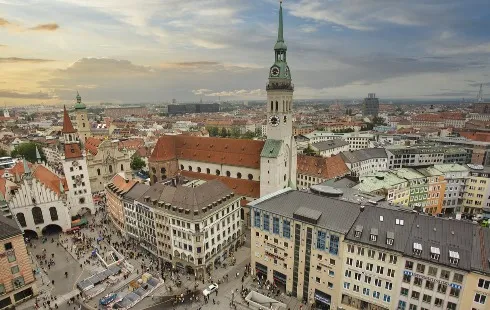
Gonadorelin Peptide: A Gateway to Understanding Endocrine Dynamics
Section: Science
 As the autumn of 2023 approaches, Bavaria is gearing up for its state election, a pivotal event that occurs every five years. The intricate dance of political preparations is underway, with parties shaping their campaigns and candidates securing their nominations. This article aims to unravel the key aspects of the upcoming Bavarian State Election and provide insights into its dynamics.
As the autumn of 2023 approaches, Bavaria is gearing up for its state election, a pivotal event that occurs every five years. The intricate dance of political preparations is underway, with parties shaping their campaigns and candidates securing their nominations. This article aims to unravel the key aspects of the upcoming Bavarian State Election and provide insights into its dynamics.
Date and Candidates: A Dual Electoral Engagement
The Bavarian State Election, scheduled for October 8, 2023, holds a twofold significance for voters. On this day, not only will they cast their ballots for the state parliament, known as the Landtag, but they will also participate in the selection of members for the seven Bavarian district councils. This dual electoral engagement aims to shape the trajectory of governance at both state and regional levels.
Electoral Process and Participants
Every eligible voter possesses the power to exercise two votes in the Bavarian State Election. These votes hold distinct purposes: the first vote is directed towards a preferred local candidate within the electoral district, while the second vote is allocated to a political party of choice. The combined results of these votes will determine the composition of the Landtag, which consists of around 200 representatives.
Out of these representatives, 91 will secure their seats through direct mandates within the constituencies, while another 89 will enter the Landtag through party lists. Additionally, the possibility of compensatory mandates exists, ensuring proportional representation across parties.
It's important to note that the state premier, or Minister President, is not elected through this process. Unlike systems in the United States or France, Bavaria follows a parliamentary model where the head of government is determined by the Landtag. The party holding the majority in the Landtag usually takes the reins of governance. Historically, this role has predominantly been assumed by the Christian Social Union (CSU).
Parties in the Fray: A Pluralistic Spectrum
The political landscape is set to be lively, with a diverse array of 19 parties participating in the election. Among these are established entities such as the CSU, Greens, Free Voters, SPD, AfD, FDP, and Left Party. Additionally, 12 other parties, ranging from more recognizable ones like the Ecological Democratic Party (ÖDP) to more niche groups like the Party for Medical Rejuvenation Research, are also in the mix. The final lineup is yet to be confirmed, as parties finalize their submissions by mid-August.
An intriguing note: The CDU and the South Schleswig Voter Federation are eligible to present their own lists for the election, despite not being traditional players in Bavarian politics.
Key Contenders and their Leading Figures
Amid this political tapestry, significant figures emerge as front-runners for their respective parties. Notable among them is Markus Söder, set to lead the CSU campaign. He has held the position of Bavarian Minister President since March 2018 and took on the role of party chairman in 2019. The Free Voters are banking on the leadership of Bavarian Minister of Economic Affairs, Hubert Aiwanger.
Likewise, the Social Democrats and the FDP have aligned with their faction and state leaders: Florian von Brunn for the SPD and Martin Hagen for the FDP. The Greens are adopting a dual-lead strategy with Katharina Schulze and Ludwig Hartmann, the co-chairpersons of their parliamentary group. On the AfD front, Katrin Ebner-Steiner and Martin Böhm take the helm as a joint leadership team.
The Landtag's Role: Legislation, Budgeting, Governance Oversight
The Landtag fulfills several pivotal functions in Bavaria's political structure:
Legislative Power: The Landtag deliberates and decides on laws applicable within Bavaria. Although the government proposes legislation, the final authority rests with the parliament. It's important to note that many policy domains are under federal jurisdiction, leaving the state with limited decision-making power.
Budget Approval: Every expenditure by the Bavarian state authorities requires parliamentary approval. Whether it's salaries for educators and law enforcement officers, funding for hospital construction, or regional train services, the Landtag holds the purse strings.
Executive Selection and Oversight: The Landtag plays a role in the appointment of the Minister President and their cabinet. Moreover, the parliament exercises oversight over the government and the entire state administration. This oversight includes questioning ministers, addressing discrepancies, and even setting up investigative committees.
The Political Landscape and Historical Trends
Since 1946, the CSU has predominantly governed Bavaria, with only a brief interlude from 1954 to 1957 when the Social Democrats led the state government. Currently, a coalition of the CSU and Free Voters is at the helm, following the CSU's loss of an absolute majority in the 2018 state election.
As Bavaria gears up for the State Election on October 8, citizens will cast their votes with a vision of shaping the state's political future and influencing the composition of its governance bodies. The outcome will determine not only the trajectory of legislation but also the key figures responsible for steering the state's course.
Voting Eligibility and Civic Participation
Participation in this electoral process is open to all German citizens aged 18 or older, residing in Bavaria for at least three months, and not stripped of their voting rights through legal judgments. Those eligible can also become candidates, provided they are nominated by a recognized party or voter group (as mentioned earlier).
In conclusion, the upcoming Bavarian State Election promises to be a significant milestone in the state's political narrative. As the diverse array of parties, leaders, and voters converge on the ballots, their choices will reverberate across the corridors of power, shaping the governance and policies of Bavaria for years to come.

Section: Science

Section: Health

Section: Arts

Section: Health

Section: Science

Section: News

Section: News

Section: Health Insurance

Section: Health

Section: News
Health Insurance in Germany is compulsory and sometimes complicated, not to mention expensive. As an expat, you are required to navigate this landscape within weeks of arriving, so check our FAQ on PKV. For our guide on resources and access to agents who can give you a competitive quote, try our PKV Cost comparison tool.
Germany is famous for its medical expertise and extensive number of hospitals and clinics. See this comprehensive directory of hospitals and clinics across the country, complete with links to their websites, addresses, contact info, and specializations/services.
The granddaughter of Claire Zachanassian makes a return to Güllen, the impoverished hometown of her late grandmother, for a performance. Having never fully engaged with her grandmother's past, she is eager to finally discover Güllen. The sound of her last name stirs the entire town into action.



No comments yet. Be the first to comment!